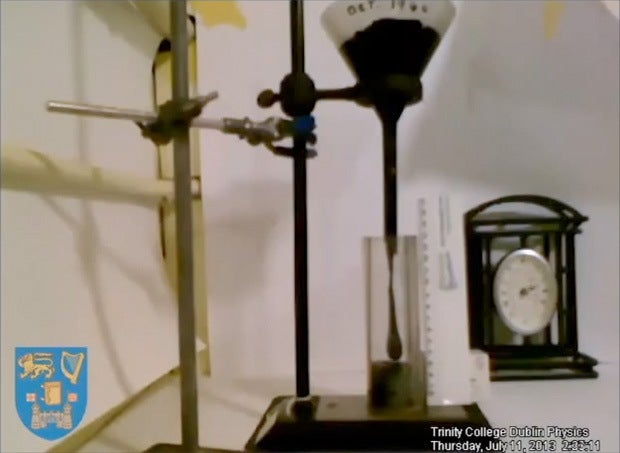The Independent's journalism is supported by our readers. When you purchase through links on our site, we may earn commission.
The Pitch Drops: Science experiment going for 69 years caught on film for first time
Set up in 1944, the Trinity College pitch drop is one of the longest running laboratory experiments in the world

A scientific experiment first set up in 1944 has been caught on film for the first time ever. After decades of waiting, the Pitch-Tar Drop at Trinity College Dublin has finally been witnessed (albeit by a camera) with a thumb’s worth of pitch separating from its parent body and dropping into a waiting beaker.
The experiment is one of the longest running in the world, first set up 69 years ago by an anonymous colleague of Ernest Walton - a noble-prize winner best known for smashing up atoms.
The anonymous researcher who first set up the experiment sought to prove that tar pitch – a viscoelastic polymer first used for waterproofing ships and better known as asphalt – was actually a fluid capable of flowing, despite shattering when hit with a hammer.
To prove this hypothesis a lump of pitch was heated and placed into a funnel, this funnel suspended over a jar and then this whole set-up placed in a dusty cupboard and left. Not just for weeks or months, but for years, then decades.
The pitch would drop eventually it’s just that no-one knew when exactly. And who could keep an eye on it whilst waiting? In this sense the pitch drop is one of the simplest experiments in the world. All it needs is time (lots of time) and someone to watch it happening.
Unfortunately, the actual watching has proved harder than you would think. The Trinity College set up is itself actually a replication of the longest-running laboratory experiment in the world - a Pitch Drop at Queensland University first started in 1927.
Since it started the Australian pitch has dropped eight times – an average of one drip per decade- and yet despite this positively clockwork-like regularity the even itself has never actually been seen, by either human or digital eyes.
This may seem near impossible, but the Queensland experiment has been the victim of a number of sitcom-worthy mishaps including one drop when the professor in charge (John Mainstone) simply chose the wrong time to step out for a cup of tea. Gone 15 minutes, he came back to find the drop had fallen – that’s the nature of the experiment, a decade of waiting for mere seconds of action.
With this history in mind, it’s no wonder that the Trinity College drop is being celebrated. Speaking to Hal Hodson at the New Scientist, Trinity College's Shane Bergin said, "No one has ever seen a drop fall anywhere in the. It's one of the oldest experiments – an oddity, a curiosity."
Analysing the new footage scientists have estimated that the pitch is two million times more viscous than honey, and two billion times more viscous than water, and with one drop under their belt, they’re looking forward to the next.
"We have great plans for the next drop and a decade to put them into action," says Bergin. "Within ten years, God knows what kind of technology will be available. We'll be keeping up with that to capture the next one in all its stunning beauty."
Join our commenting forum
Join thought-provoking conversations, follow other Independent readers and see their replies
Comments
Bookmark popover
Removed from bookmarks